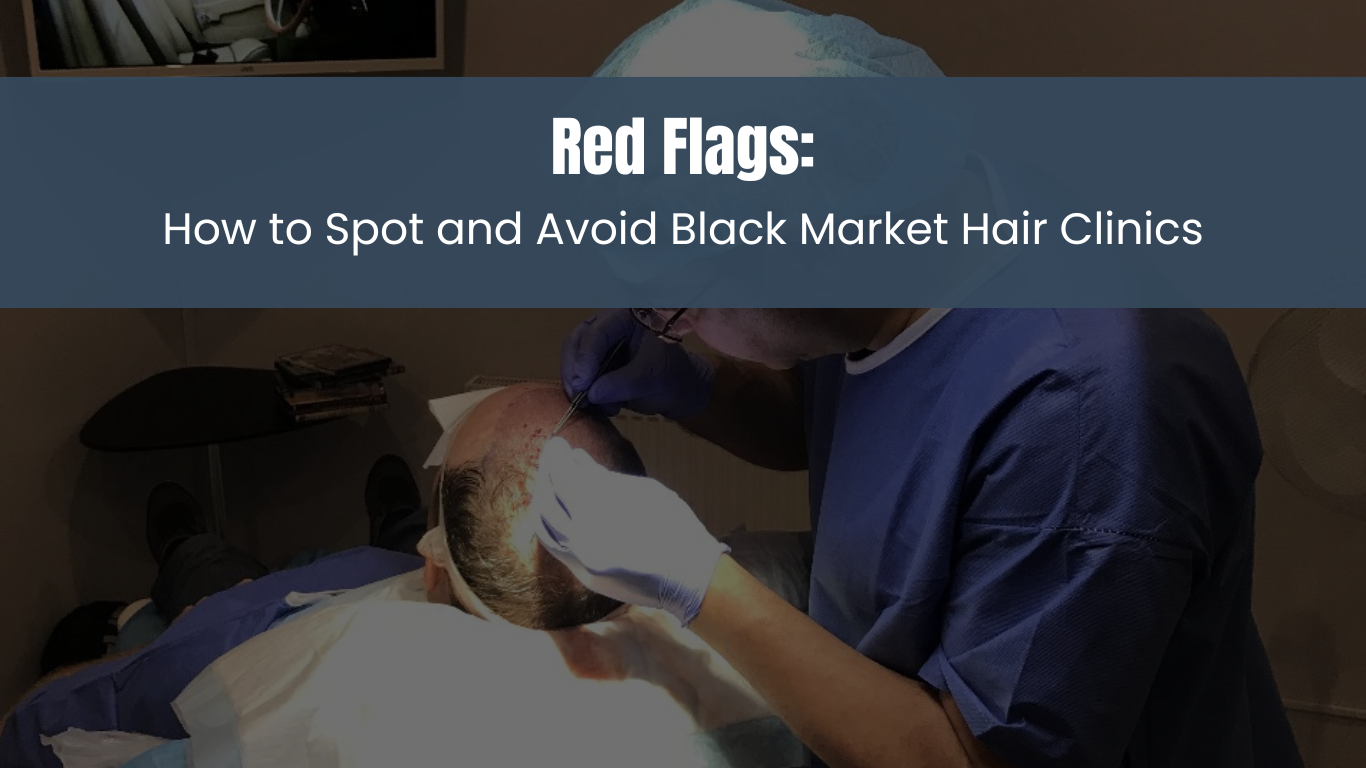
Hair loss is a concern that affects many people, often leading to emotional distress and a strong desire for effective treatment. While hair transplant surgery can offer genuine results, the rise of unregulated black market clinics poses a serious risk. These facilities may present themselves as professional, but many operate outside accepted medical standards, leaving patients vulnerable to harm.
This article outlines what constitutes a black market hair clinic, why these clinics are dangerous, how to recognise them, and what you can do to make informed and safe choices about hair restoration.
A black market hair clinic is an unauthorised facility where surgical hair restoration is performed by individuals without adequate medical training or registration. In such clinics, critical steps of the procedure are often carried out by technicians or untrained staff rather than qualified surgeons.
The International Society of Hair Restoration Surgery (ISHRS) has raised concerns about some overseas clinics using unlicensed workers, including taxi drivers or displaced persons, to perform procedures. These operations may take place in unsanitary conditions, using substandard techniques, and with little or no follow-up care. Although their websites may look convincing, these clinics often operate outside the scrutiny of regulatory authorities.
Hair transplants, when done incorrectly, can result in serious physical and emotional consequences. According to the ISHRS, patients treated in black market clinics often report the following complications:
Permanent scarring
Irregular or unnatural hairlines
Sparse or uneven hair growth
Hair growing at unnatural angles
Overharvesting of donor areas, leading to visible thinning or baldness
Infections due to poor hygiene
Fewer grafts than initially promised
These issues not only compromise the final outcome but can also cause long-term psychological distress. Unfortunately, legal recourse may be limited, particularly if the clinic is based in a country with weak healthcare regulation.
Knowing what to look out for can help you avoid unsafe clinics. Here are the most common warning signs:
Low-cost “package deals” that include travel and accommodation
Promotions with time-sensitive discounts
Claims of unlimited grafts or guaranteed results
Marketing phrases like “scarless surgery”
Consultations conducted by sales staff or "patient advisors"
No opportunity to consult the surgeon prior to the procedure
A lack of detailed staff qualifications or medical registration on the clinic’s website
Conduct thorough research. Check reviews on independent medical forums and speak with previous patients if possible.
Verify the surgeon’s credentials. Ensure they are registered and affiliated with respected organisations such as ISHRS or BAHRS.
Insist on meeting the surgeon. You should never proceed with surgery unless you’ve consulted directly with the person performing it.
Avoid being pressured. Reputable clinics will not push you into quick decisions through limited-time deals.
Understand local laws. If considering treatment abroad, be aware of the medical standards and legal protections in that country.
It can be, but only if the clinic and surgeon are verified and medically certified. Never base your decision solely on cost.
In most countries, no. Only licensed surgeons should perform the surgical steps. Technicians may assist under medical supervision but must not lead the procedure.
Cancel the appointment and seek advice from a certified hair restoration specialist or a recognised medical authority.
No. Black market clinics are found worldwide, including in the United Kingdom. Always check qualifications regardless of the clinic’s location.
In some instances, yes, but the process can be complex, expensive, and results may vary. Prevention is always the better option.
Choosing a clinic purely based on low pricing
Taking unrealistic promises at face value
Failing to check professional credentials
Skipping consultation with the actual surgeon
Trusting only the information on the clinic’s own website
Hair transplants are surgical procedures that require skill, experience, and a medically regulated environment. Black market clinics often bypass these requirements, placing patients at significant risk of physical harm and emotional distress.
Protect yourself by doing the necessary research, speaking directly with qualified professionals, and ensuring the clinic follows proper medical standards. Always prioritise safety over convenience or price.
If you are considering a hair transplant, begin by consulting a surgeon affiliated with the ISHRS or BAHRS. Taking the time to verify credentials and understand your options can make all the difference in achieving safe and satisfying results.
A: Warning signs include vague information about staff, high-pressure sales techniques, and promises that sound too good to be true.
A: Both the ISHRS and BAHRS websites offer directories of verified, licensed hair restoration surgeons.
A: Some may be genuine, but many can be manipulated or paid. Always look for independent, verified sources.
A: Legal protection can be limited. Clinics based in poorly regulated regions may offer little accountability.
A: Not always. While skilled surgeons can address some complications, outcomes are not guaranteed and treatment may be costly.